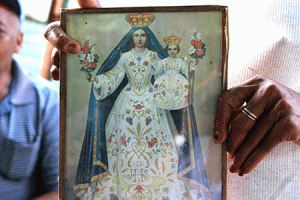Decolonizing Knowledge: Afro-Indigenous Women Healers in the Caribbean and Its Diasporas
by Professors Alaí Reyes-Santos and Ana-Maurine Lara

Last September, with support from CLLAS funding, we began interviewing Afro-indigenous women healers in the Dominican Republic. These initial interviews are part of what we envision as a 10-year project that documents Afro-indigenous healing traditions kept and/or recovered by women from the Spanish-speaking Caribbean and U.S. Latinx Caribbean communities.
On a very humid morning, we drove to the outskirts of the city of Santo Domingo and met Iya Abbebe Oshun. Throughout the day, she and her family shared coffee, food, and stories about her life as a healer in the Dominican Republic. Iya Abbebe Oshun migrated from Cuba to the Dominican Republic in 2001. Originally she mostly worked as a journalist. But eventually her healing work as a priestess of Regla de Asha—an Afro-Caribbean spiritual tradition—turned her home into an ilé (religious house). Here, a transnational community of people gathers almost every day. They come seeking healing and/or to be trained as healers. As she spoke with us, it became evident that aside from responding to the calls of her spirits and orishas, “darle valor a la mujer,” (empowering women) was one of the concerns that moved her to commit full-time to her healing work.
She shared with us memories of accompanying women to healing from abuse and violence. Using various healing modalities, including mediumship and divination with the orishas, she worked to affirm women’s capacities to care for themselves, reach their human potential, and care for their families and communities. Migrants and people living across multiple diasporas have also found a home there. Russians, Puerto Ricans, Hondurans, Peruvians, U.S. Latinxs, African Americans, as well as Dominicans and Cubans, can be found in her house at any point. And, LGBT, queer, gender-nonconforming and trans-people have also made the ilé into their home, requiring her engagement with the meaning of gender in Afro-Caribbean life and spiritual practices.
The following week we went into the countryside, to a rural community in the mountainous region of the San Cristobal province. San Cristobal is known as a historically (marrón) community where people practice indigenous, Afro, and Afro-indigenous healing forms. There we met with Doña Adela and her husband, Don Fidelio. This couple is a bastion for the local community. Their family belongs to the local agrarian cooperative, known as a convite. And their home is open to anybody showing up with an illness any time of the day. During our visit and interviews, people kept stopping by to check if they could bring a family member who was ill later or to pick up a remedio (herbal remedy) that had been prepared earlier.
Doña Adela shared with us the medicinal values of many plants in her own garden. We were introduced to the vast pharmacopeia of this region, where medicinal plants dwell alongside and within orchard forests. Doña Adela’s capacity to work with the plants is sustained through her devotion and communal pilgrimages to visit La Virgen de los Remedios in the southern provinces of the Dominican Republic. Likewise, Don Fidelio taught us santiguos (medicinal prayers) to cure people of dangerous spider bites, and spoke to us not only of treatments he had carried out, but also of those he had received. They also drew our attention to the community’s celebration of the indios in the caves where the palo musicians, led by Don Fidelio, play the drums and where Doña Adela leads ceremonies with other healers. These ceremonies serve to mediate the interactions between people in this world and the world of the spirits.
These encounters made it clear to us that these women healers, both elders, play important roles in the well-being of their communities. They are recognized as empowered women even in contexts where Western European medicinal models, development projects, and narratives of indigenous genocide and anti-black racism dismiss their healing work as superstition. Their willingness to share their stories and knowledge came from their understanding that new generations must carry their people’s healing traditions forward.
Now we are meeting Afro-indigenous women healers in the Diaspora—in the Southwest, and in the Pacific Northwest. We are looking to document how a new landscape and migratory experience impacts their healing work, as well as the role it plays in their communities. And we hope to create educational spaces where their knowledge is valued and honored so far away from home.
—Alaí Reyes-Santos, Associate Professor, Department of Ethnic Studies, and Ana-Maurine Lara, Assistant Professor, Department of Anthropology, were funded in part by a CLLAS Faculty / Collaborative Research Grant.
